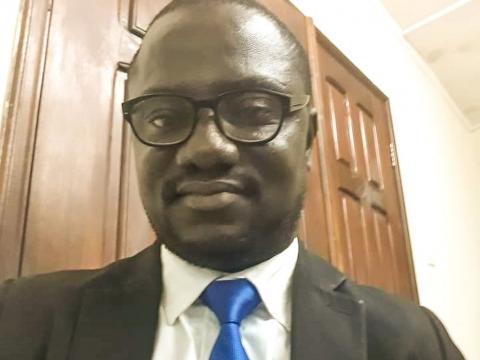By Alpha Abu
The Media Reform Coordinating Group (MCRG) has launched a report on the state of media freedom in Sierra Leone, highlighting the need for safety of journalists as contained in responses provided by media houses. The event which took place at SLAJ’s Harry Yansaneh hall in Freetown on Friday 2 July 2021 was to highlight issues related to freedom of the press over the last three years, 2018-2020.
The report presented by MRCG Coordinator Dr. Francis Sowa looked at numerous aspects of the media space in the country, including summary of press freedom violations recorded over the period, status of redress of violations, key perpetrators and victims and analysis of trends of violations.
According to the report “almost all the respondents have encountered at least one of the following violations: intimidation, harassment, humiliation, arrest, detention (and) physical attack”, regarding the safety and security issues journalists face in Sierra Leone, some journalists were quoted saying such violations were being influenced by politicians and perpetrated by Police. Community stakeholders were also named for posing a threat to the work of journalists especially those attached to community media houses like radio stations.
“On the aspect of perpetrators and violators of journalists press freedom and endangering their safety in their line of duty, the safety study findings stated that the respondents named various categories of people as the perpetrators of the violations, with the Sierra Leone Police and politicians being the most culpable perpetrators of those violations”, the report states. Chiefs or community Stakeholders, Military personnel, Civil Servants and members of the public were also the other perpetrators the report highlighted.
“On the approach to ensuring the safety of journalists, many media houses do not have a holistic approach as they attend to safety threat and issues as they arise”, the report notes.
Based on key responses from journalists interviewed, it was recommended that media houses “provide resources and safety equipment for their staff on a regular basis”. The report also stressed the need for frequent provision of staff advice and mentorship, and training programmes on safety security issues for all personnel. Reviewing of the arrest and detention of journalists over the years using Part V of the seditious libel law before its recent repeal, and recommendation to both “governmental and non-governmental stakeholders”, were also looked at.
The MRCG coordinator told the gathering that the very aspect of the Public Order Act (POA) impeded the media’s effort in what he said was “fulfilling its democratic roles due to increased fear of incarceration arising from the provisions of the law which undermined freedom of expression guaranteed by the constitution of Sierra Leone”.
He added: “The POA served as an obstacle to the media in terms of fulfilling its democratic roles due to increased fear of incarceration arising from the provisions of the law which undermined freedom of expression guaranteed by the Constitution of Sierra Leone, Act No.6 of 1991 and by extension, international best practices and standards”, Dr. Sowa observed. He said those events then, smeared the country’s democratic credentials and affected its press freedom rankings. He said President Julius Maada Bio’s signing of the Public Order (Amendment) Act 2020 into law on the 28th October, 2020 was a fulfillment of his campaign promise to repeal criminal and seditious libel provisions in the country.
He believed the new development is expected to create the enabling environment for the government to be held accountable by the media and civil society activists, so as to promote good governance.
He spoke of how MRCG and the National Endowment for Democracy(NED) in the United States of America from 2018to2020, looked at 29 cases recorded dealing with invitations, intimidations, attacks, assaults, arrests, detntions and prosecution of journalists and civil society activists. “The data showed that sixteen were concluded, settled, resolved, dropped or abandoned because of lack of progress; four were in court; and nine were under police investigation/inconclusive/stalled.”
He revealed that MRCG has brought to the attention of the Ministry of Information and Communication, the inconclusive cases and that the Ministry has responded through a letter that action is being taken to address those issues. Dr. Sowa said a letter has also been sent to the Attorney General for action on those cases and called on government, organisations, institutions and the media houses themselves to all contribute to safeguarding the work of journalists in Sierra Leone. He said in the 2021 World Press Freedom Index compiled by Reporters without Borders (RSF), Sierra Leone moved up 10 places in the index, now at 75th position due to the repeal of the law criminalising press offences in Sierra Leone.
The report was produced by MRCG and the Media Foundation for West Africa with support from the Open Society Initiative for West Africa (OSIWA).
Copyright © 05/07/21 Politico Online








